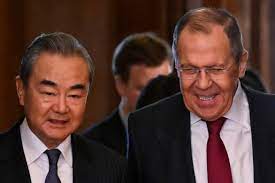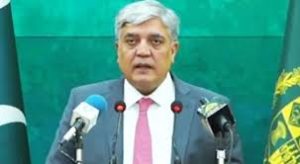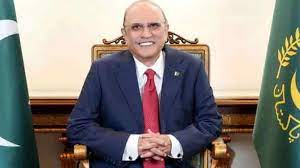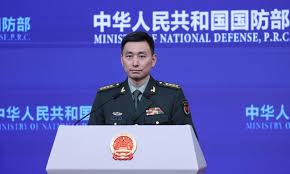World Insights: China’s position on political settlement of Ukraine crisis impartial, constructive

Beijing: Stephane Dujarric, spokesman for United Nations Secretary-General Antonio Guterres, said the position paper by China represents “an important contribution.”
Observers believe the peace plan serves the interests of both sides in the conflict and responds to the common concerns of the international community, demonstrating China’s commitment to objectivity and fairness as well as its role as a responsible major country in times of grave global challenges.
BEIJING, Feb. 27 (Xinhua) — China released a paper stating its position on the political settlement of the Ukraine crisis on Friday, as the world marked one year since the full escalation of the crisis.
In the paper, China proposes a solution to the crisis that addresses both the symptoms and root causes, affirming that dialogue and negotiation are the only viable solution to the Ukraine crisis.
Stephane Dujarric, spokesman for United Nations (UN) Secretary-General Antonio Guterres, said the position paper by China represents “an important contribution.”

Observers believe the peace plan serves the interests of both sides in the conflict and responds to the common concerns of the international community, demonstrating China’s commitment to objectivity and fairness as well as its role as a responsible major country in times of grave global challenges.
“In the face of war flames, all you need is to pour water, not fuel,” Marcos Cordeiro Pires, a professor at Brazil’s Sao Paulo State University, told Xinhua.
One year into the Ukraine crisis, the conflict seems nowhere near over. Behind the prolonged, magnified conflict is incessant Western military aid to Ukraine and sanctions on Russia. Now spillovers of the crisis are taking a toll on the world: a cost-of-living squeeze, a massive migrant flow, and more.
In the paper, China urges the resumption of peace talks and the avoidance of further escalation of conflict, and opposes the use or threat of use of nuclear weapons, which is crucial to global security and the sustainable development of humanity, Pires said.
The Ukraine crisis shows that in today’s world, it is impossible to win with weapons, much less achieve peace with weapons, said Croatian political analyst Drago Horvat.
Zoltan Kiszelly, director of the Center of Political Analyses at Hungary’s Szazadveg Institute, said the position paper by China on the Ukraine crisis is a very important contribution to preventing a new global Cold War era from forming.
Belarusian President Alexander Lukashenko said the position paper is an example of China’s pursuit of a foreign policy of peace as well as a “new and original measure” that will have far-reaching significance.
Former Croatian Deputy Prime Minister Ante Simonic said that the position paper issued by China is of great significance not only to Russia and Ukraine, but also to the international community.
Ali El-Hefny, secretary general of the Egyptian Council for Foreign Affairs, also a former Egyptian ambassador to China, said that the paper reflects a policy and a clear vision on international relations that China has always adopted throughout its history.
Meanwhile, many expressed appreciation for China’s constructive role in pushing for a peaceful settlement of the crisis since the very start, believing that the position paper issued by China shows the right path and calls on the international community to pay attention to China’s proposal and make joint efforts to promote peace talks.
“The paper is certainly an important contribution,” El-Hefny said.
China’s position paper is a very good solution to the crisis, Horvat said, hoping that the international community will put China’s peace plan on the agenda as soon as possible.
Rabia Akhtar, director of the Center for Security, Strategy and Policy Research at the University of Lahore in Pakistan, said that China, as a responsible permanent member of the UN Security Council, has issued a position paper that prioritizes advocating world peace. Akhtar urged the world to heed China’s call and join forces to bring all parties to the conflict to the negotiating table.
Addressing a high-level Security Council briefing on Ukraine, Dai Bing, charge d’affaires of China’s permanent mission to the United Nations, expounded on China’s position, saying that China has always taken an objective and impartial stance based on the merits of the issue, and is ready to continue to play a responsible and constructive role in resolving the Ukraine crisis.
China’s position paper stated the basic principle that “universally recognized international law, including the purposes and principles of the United Nations Charter, must be strictly observed. The sovereignty, independence and territorial integrity of all countries must be effectively upheld” in dealing with the crisis.
Filipe Porto, a researcher at the Brazilian Foreign Policy Observatory, said the paper reflects China’s consistent objective stance in dealing with the Ukraine crisis.
Mohammad Reza Manafi, editor-in-chief for the Asia-Pacific news desk of Iran’s official news agency IRNA, agrees, saying China’s position paper is comprehensive and complete and fully respects the UN principle of national sovereignty, in particular the sovereignty and territorial integrity of both sides to the conflict.
China has not taken sides in this conflict, but is actively and sincerely seeking a peaceful solution to the crisis, he said.
On Saturday, the Ministry of Foreign Affairs of Kazakhstan released a statement, saying the country welcomes China’s position on the political settlement of the Ukraine crisis, which deserves support as contributing to the cessation of bloodshed on the basis of territorial integrity, independence and sovereignty of states in accordance with the fundamental principles of the United Nations Charter.
The Iranian Foreign Ministry issued a statement on Sunday, saying that Iran supports China’s position and “believes that the elements reflected in this document are sufficient for commencing negotiations on developing a mutually-agreed framework for ending the military activities in Ukraine, stopping unilateral measures and restoring the situation in accordance with the principles of the UN Charter.”
The continuation of the conflict is the result of the intensification of long-accumulated contradictions in regional security. China’s position paper reiterated that all parties should, following the vision of common, comprehensive, cooperative and sustainable security and bearing in mind the long-term peace and stability of the world, help forge a balanced, effective and sustainable European security architecture. It also noted that all parties should oppose the pursuit of one’s own security at the cost of others’ security, prevent bloc confrontation, and work together for peace and stability on the Eurasian Continent.
China’s position paper is a powerful contribution to the project of building peace in Europe. While not taking sides, the paper highlights the crucial elements required for this terrible crisis to be brought to a conclusion, said British political commentator Carlos Martinez in a written interview with Xinhua.
The protracted crisis has affected the cause of world peace and development. Though not a party to the crisis, China, as a responsible major country, has not stood idly by but played a responsible and constructive role in easing the situation and defusing the crisis.
China’s position paper covers all aspects of the conflict, and not only emphasizes the basic principles of opposing the threat or use of nuclear weapons, and stopping abusing unilateral sanctions and “long-arm jurisdiction” against other countries, but also puts forward specific solutions to the global food crisis and humanitarian crisis, said Pakistani scholar Akhtar.
This comprehensive paper urges all parties to the conflict to rethink their positions and turn to seeking a diplomatic solution, Akhtar noted.
Many observers have noticed China’s special status as a non-party to the Ukraine crisis, arguing that the more “pragmatic” and “non-biased” Chinese solution offers a new path that differs from the West.
In Zoltan’s view, most regions and countries in the world are not involved in conflicts and remain neutral, and it is very positive progress that China, as a permanent member of the Security Council and an important economy in the world, has proposed a constructive plan with peace as the goal, representing the voice of most regions and countries in the world.
To build a safer world is the strong aspiration of all peoples and the unswerving pursuit of China. On Feb. 21, China released The Global Security Initiative Concept Paper, which, together with the position paper on the political settlement of the Ukraine crisis, demonstrates China’s responsibility to work with the international community to safeguard global security and propose more feasible measures to solve the current security dilemma.
The two documents are practical initiatives and ideas put forward by China to safeguard world peace and security, helping to inject more stability into the international community plagued by various disputes, and therefore widely supported by peace-loving people worldwide, said Kwon Ki-sik, head of the Korea-China City Friendship Association.
British expert Martinez said both papers reflect a profound desire for peace and global prosperity, and demonstrate a clear understanding that peace and prosperity require a reorientation of international relations towards multilateralism, cooperation, non-interference, respect for sovereignty and respect for diversity.
In the face of emerging global challenges, the international community is more aware that human beings live in the same global village and belong to a community with a shared future.
Porto believes that the vision of a community with a shared future for mankind, as well as the Global Development Initiative, the Global Security Initiative and the position on the political settlement of the conflict in Ukraine, which are concrete manifestations of this vision, are major contributions of China’s diplomacy to the world.
They offer Chinese solutions to global issues, telling people that security must be guaranteed through development, and development must also be guaranteed through security, rather than through war or hegemony.





